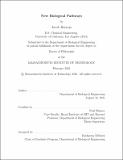New Biological Pathways
Author(s)
Borrajo, Jacob
DownloadThesis PDF (63.22Mb)
Advisor
Blainey, Paul
Terms of use
Metadata
Show full item recordAbstract
Through synthetic biology, our species is now learning to give biology instructions by using microscopic – often designed – biological components, allowing biology to conduct highly specialized forms of work previously unseen in nature. In this thesis, I propose and develop three new biological pathways which can perform three different categories of work i) information retrieval ii) information storage and iii) information editing.
For information retrieval, I propose repurposing viral capsid proteins to perform non-destructive transcriptomic measurements. We demonstrate that this approach allows for live-cell transcriptomics, and we longitudinally measure the transcriptional responses of the same living human cells after stimulation with TNFa.
For information storage, I propose and develop trans-splicing as a strategy to barcode the introduction of genetic elements en masse, and show that cell transcriptomes can be reliably barcoded for facile information storage.
For information editing, I propose and develop a new RNA splicing machine – the splice editor – which can edit long stretches of mRNA sequences. I demonstrate that this CRISPR/Cas13 guided editor can perform exon replacement, which may one day lead to a new class of therapeutics.
Altogether, this thesis showcases three new biological pathways, and demonstrates that living biological systems can be instructed to perform various kinds of complex, biological work.
Date issued
2022-02Department
Massachusetts Institute of Technology. Department of Biological EngineeringPublisher
Massachusetts Institute of Technology